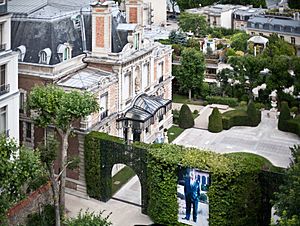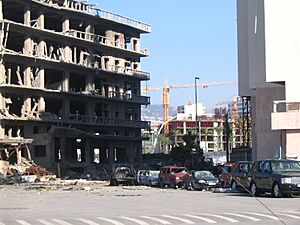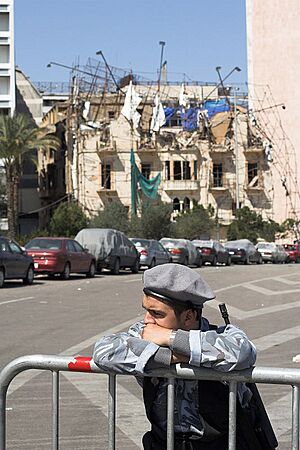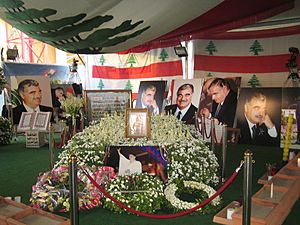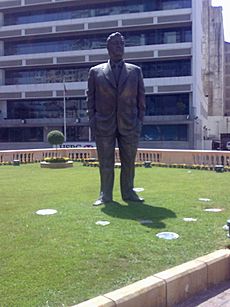Rafic Hariri facts for kids
Quick facts for kids
Rafic Hariri
|
|
|---|---|
| رفيق الحريري | |
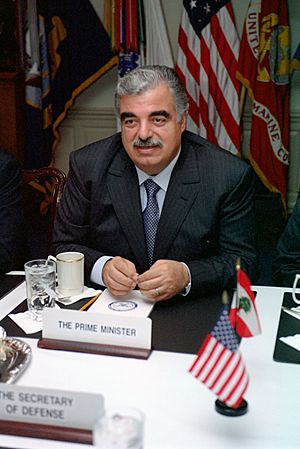
Hariri in 2001
|
|
| Prime Minister of Lebanon | |
| In office 23 October 2000 – 21 October 2004 |
|
| President | Émile Lahoud |
| Deputy | Issam Fares |
| Preceded by | Selim Hoss |
| Succeeded by | Omar Karami |
| In office 31 January 1992 – 2 December 1998 |
|
| President | Elias Hrawi Émile Lahoud |
| Deputy | Michel Murr |
| Preceded by | Rashid el-Solh |
| Succeeded by | Selim Hoss |
| Minister of Finance | |
| In office 31 October 1992 – 4 December 1998 |
|
| Prime Minister | Himself |
| Preceded by | Asaad Diab |
| Succeeded by | Georges Corm |
| Member of Parliament | |
| In office 20 October 1992 – 14 February 2005 |
|
| Succeeded by | Saad Hariri |
| Constituency | Beirut |
| Personal details | |
| Born |
Rafic Bahaa El Deen Al Hariri
1 November 1944 Sidon, Lebanon |
| Died | 14 February 2005 (aged 60) Beirut, Lebanon |
| Nationality | Lebanese and Saudi Arabian |
| Political party | Future Movement |
| Spouses | Nidal Bustani Nazik Hariri |
| Children | Bahaa, Saad, Houssam, Ayman, Fahd, Hind |
Rafic Hariri (born 1 November 1944 – died 14 February 2005) was a very successful Lebanese businessman and politician. He served as the Prime Minister of Lebanon two times. His first term was from 1992 to 1998, and his second was from 2000 until 2004.
Hariri led five different governments during his time as Prime Minister. He is well-known for helping to create the Taif Agreement. This agreement helped end the 15-year Lebanese Civil War. He also played a big part in rebuilding Beirut, the capital city of Lebanon. He was the first Prime Minister after the civil war and was a very rich and powerful politician.
Sadly, Rafic Hariri was killed on 14 February 2005. His death caused huge political changes in Lebanon. Large protests, known as the Cedar Revolution, helped Syrian troops leave Lebanon. This also led to changes in the Lebanese government. At one point, Hariri was one of the world's 100 richest people. He was also the fourth-richest politician.
Contents
Early Life and Education
Rafic Hariri was born on 1 November 1944. He came from a humble family in Sidon, a port city in Lebanon. He had two siblings, a brother named Shafic and a sister named Bahia.
He went to elementary and secondary school in Sidon. Later, he studied business administration at Beirut Arab University.
Business Career and Philanthropy
In 1965, Hariri moved to Saudi Arabia to work. He taught there for a short time before starting in the construction business. In 1978, he became a citizen of Saudi Arabia, while also keeping his Lebanese citizenship.
In 1969, Hariri started a small construction company called Ciconest. It did not last long. He then worked with a French construction company, Oger. They built a hotel in Taif, Saudi Arabia. The hotel was finished on time, which impressed King Khaled. Hariri later took over Oger and created Saudi Oger. This company became the main builder for important projects for the Saudi Royal family. Because of this, Hariri became a multi-billionaire just a few years after his first contract with King Khaled.
After becoming very wealthy, Hariri began many projects to help others. He built schools in Lebanon. In 1979, he started the Islamic Association for Culture and Education. This group was later renamed the Hariri Foundation. Hariri became more and more involved in politics. He gained international recognition for his efforts to help people. He spoke to the United Nations and worked as a representative for the Saudi Royal family.
In 1982, Hariri gave $12 million to Lebanese people affected by a conflict. He also used his company's money to help clean up Beirut's streets. He helped with early rebuilding efforts during breaks in the war. Some people accused him of helping to destroy parts of Beirut to rebuild them and make money. After the conflict, he worked as a Saudi representative in Lebanon. He helped set up the 1989 Taif Accord. This agreement, organized by Saudi Arabia, brought fighting groups together. The Taif Accord ended the Lebanese Civil War, which made Hariri popular in politics.
Political Leadership in Lebanon
Hariri returned to Lebanon in the early 1980s as a rich man. He started to become well-known by giving large donations to various groups. He also continued to advise Prince Bandar bin Sultan in 1983. He played a key role in creating the 1990 Taif Agreement, which ended Lebanon's civil war.
In 1992, Hariri became the first Prime Minister of Lebanon after the civil war. He served under President Elias Hrawi. He was also the Minister of Finance. After the 1996 elections, he also became the Minister of Post and Telecommunications. Hariri helped Lebanon's economy by issuing international bonds. He was praised for his plan to borrow money for rebuilding. His first time as Prime Minister lasted until 1998. Salim Hoss replaced him. Hariri left office because of disagreements with the new president, Émile Lahoud.
In October 2000, Hariri was again chosen as Prime Minister. He replaced Salim Hoss and formed a new government. In September 2004, Hariri supported a United Nations resolution. This resolution asked for all foreign troops to leave Lebanon. On 20 October 2004, his second term ended when he resigned. Omar Karami became the next Prime Minister.
Economic Plans and Impact
Hariri started a strong new economic plan. In 1992, prices were rising very fast (131% inflation). But people trusted Hariri's leadership, and within two years, inflation dropped to 12%. One of Hariri's most important creations was "Horizon 2000." This was the government's plan to rebuild Lebanon.
A big part of "Horizon 2000" was Solidere. This was a private construction company created to rebuild Lebanon after the war. Solidere was owned by the government and private investors. It focused on redeveloping downtown Beirut. The goal was to make it a new city center quickly. Solidere had the power to buy land, giving owners shares in the company instead of cash. Some people said the company did not pay former landowners enough. Another part of the plan was to sell government-owned industries to private companies. Many contracts were given out in important areas like energy, phones, electricity, airports, and roads.
Hariri also wanted to attract money from other countries. He made tax rules simpler and offered tax breaks to foreign investors. Because of his past success in business and his international connections, Hariri was able to get many low-interest loans from foreign investors. He also kept strict rules on banks to control rising prices and make the Lebanese currency stronger.
Hariri's economic plans were very successful in his first year. From 1992 to 1993, the country's income grew by 6 percent. Banks doubled their money, and government earnings were about a billion dollars. However, by 1998, economic growth had slowed down. The national debt grew a lot, from $2 billion to $18 billion. Lebanon's economy was in a difficult state.
Hariri and Lebanon's Politics
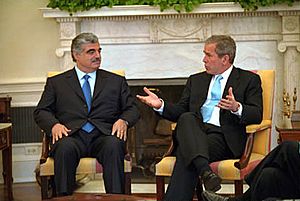
Hariri resigned as Prime Minister during a political crisis. This crisis was about extending President Émile Lahoud's term. Hariri said he would not try to lead the next government.
In a 2001 interview, Hariri was asked why he did not hand over members of Hezbollah accused of being terrorists by America. He replied that Hezbollah was protecting Lebanon from Israeli occupation. He also called for the United Nations' resolutions against Israel to be followed. He said he was against killing anyone, whether Israeli, Palestinian, Syrian, or Lebanese. He believed in talking to solve problems. He also said that Syria should stay in Lebanon for protection until Lebanon asked them to leave.
Walid Jumblatt, a Lebanese leader, said that on 26 August 2004, Syrian President Bashar al-Assad threatened Hariri. Jumblatt claimed Assad said he would "break Lebanon" if Hariri and French President Chirac wanted him out. Jumblatt felt this meeting was a death sentence for Hariri. This meeting lasted only fifteen minutes.
On 22 June 2005, Beirut International Airport was renamed Rafic Hariri International Airport. Also, Beirut General University hospital was renamed Rafiq Hariri Hospital. Hariri's son, Saad Hariri, took over as leader of the Future Party.
Questions About His Wealth
Some people accused Hariri of becoming very rich during the time Syria was in Lebanon. It was said that his wealth grew from less than $1 billion when he became Prime Minister in 1992 to over $16 billion when he died. The company Solidere, in which Hariri was a main owner, took over most properties in downtown Beirut. It paid owners with shares in the company, which some said were worth much less than their property. It was widely known that Hariri and his business partners made a lot of money from this project.
In 1996, it was reported that money was missing from the Ministry of Finance. To get support from other political leaders, Hariri allowed them to also benefit from government spending. For example, contracts for importing oil were given to the two sons of President Elias Hrawi.
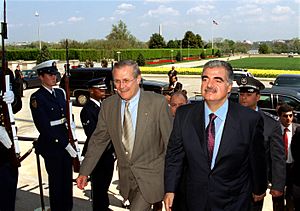
Because of growing criticism, the government banned public protests in 1994. It used the Army to enforce this rule. Hariri worked with Syria to help them control Lebanon. The government also put major TV and radio stations under the control of people who supported Syria. Supporters of Michel Aoun were often bothered and arrested.
On 25 September 1996, Hariri's government ordered 150 private radio stations and 50 TV stations to close. Only a few stations, including Hariri's own Future Television, were allowed to stay open. This decision caused about 5,000 people to lose their jobs.
Family Life
Rafic Hariri was married two times and had six children. In 1965, he married Nidal Bustani from Iraq. She is the mother of his three sons: Bahaa (born 1967), who is a businessman, Saad, who became the leader of the Future Movement after his father, and Houssam, who died in a car accident. They later divorced.
In 1976, he married his second wife, Nazik Audi. She is the mother of his other three children: Ayman, Fahd, and Hind.
From 1982 until his death, Hariri owned a large house in London. After he died, the house was given to the Crown Prince of Saudi Arabia, Sultan bin Abdulaziz.
Assassination and Aftermath
On 14 February 2005, Rafic Hariri was killed by a bomb. The bomb exploded as his car convoy drove near the St. George Hotel in Beirut. Twenty-three people died, including Hariri and several of his bodyguards. His friend and former Minister of the Economy, Bassel Fleihan, also died. Hariri was buried near the Mohammad Al-Amin Mosque with his bodyguards.
What Happened Next
Hariri was well-respected by leaders around the world. He was a close friend of French President Jacques Chirac. Chirac was one of the first foreign leaders to visit Hariri's widow in Beirut to offer his sympathy. The Special Tribunal for Lebanon was also created because of his death. Syria was first accused of the assassination. This led to Syrian troops leaving Lebanon after many protests.
After Hariri's death, there were other bombings and killings of people who were against Syria.
A special United Nations court charged several people believed to be members of Hezbollah in 2011. These people were Salim Jamil Ayyash, Mustafa Amine Badreddine, Hussein Hassan Oneissi, and Assad Hassan Sabra. In 2014, Hassan Habib Merhi was also added to the case. The case against Mustafa Badreddine ended in 2016 after reports of his death. Salim Jamil Ayyash, Hassan Habib Merhi, Hussein Hassan Oneissi, and Assad Hassan Sabra are still on trial even though they are not present in court.
More to Explore
 In Spanish: Rafiq Hariri para niños
In Spanish: Rafiq Hariri para niños
- Hariri Tribunal, the official name for the Special Tribunal for Lebanon
Images for kids
-
Rafiq Hariri with Donald Rumsfeld
 | Sharif Bey |
 | Hale Woodruff |
 | Richmond Barthé |
 | Purvis Young |


